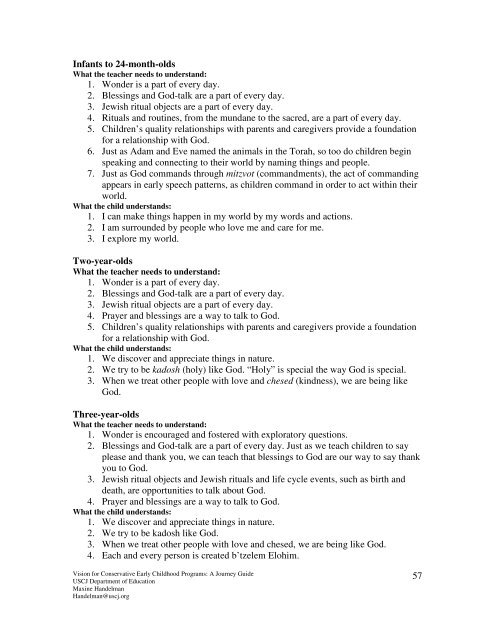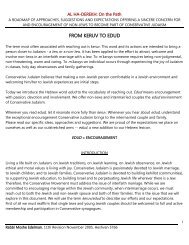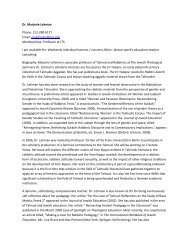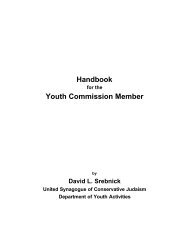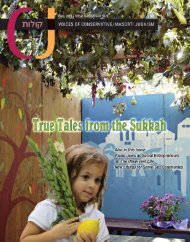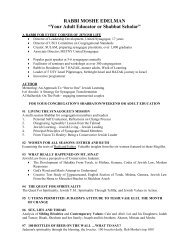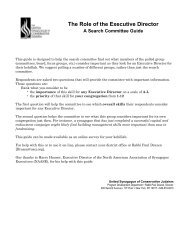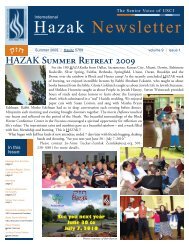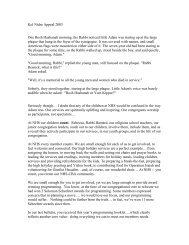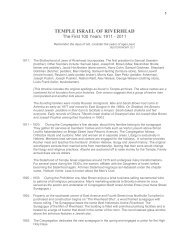Vision for Conservative Early Childhood Programs: A Journey Guide
Vision for Conservative Early Childhood Programs: A Journey Guide
Vision for Conservative Early Childhood Programs: A Journey Guide
Create successful ePaper yourself
Turn your PDF publications into a flip-book with our unique Google optimized e-Paper software.
Infants to 24-month-olds<br />
What the teacher needs to understand:<br />
1. Wonder is a part of every day.<br />
2. Blessings and God-talk are a part of every day.<br />
3. Jewish ritual objects are a part of every day.<br />
4. Rituals and routines, from the mundane to the sacred, are a part of every day.<br />
5. Children’s quality relationships with parents and caregivers provide a foundation<br />
<strong>for</strong> a relationship with God.<br />
6. Just as Adam and Eve named the animals in the Torah, so too do children begin<br />
speaking and connecting to their world by naming things and people.<br />
7. Just as God commands through mitzvot (commandments), the act of commanding<br />
appears in early speech patterns, as children command in order to act within their<br />
world.<br />
What the child understands:<br />
1. I can make things happen in my world by my words and actions.<br />
2. I am surrounded by people who love me and care <strong>for</strong> me.<br />
3. I explore my world.<br />
Two-year-olds<br />
What the teacher needs to understand:<br />
1. Wonder is a part of every day.<br />
2. Blessings and God-talk are a part of every day.<br />
3. Jewish ritual objects are a part of every day.<br />
4. Prayer and blessings are a way to talk to God.<br />
5. Children’s quality relationships with parents and caregivers provide a foundation<br />
<strong>for</strong> a relationship with God.<br />
What the child understands:<br />
1. We discover and appreciate things in nature.<br />
2. We try to be kadosh (holy) like God. “Holy” is special the way God is special.<br />
3. When we treat other people with love and chesed (kindness), we are being like<br />
God.<br />
Three-year-olds<br />
What the teacher needs to understand:<br />
1. Wonder is encouraged and fostered with exploratory questions.<br />
2. Blessings and God-talk are a part of every day. Just as we teach children to say<br />
please and thank you, we can teach that blessings to God are our way to say thank<br />
you to God.<br />
3. Jewish ritual objects and Jewish rituals and life cycle events, such as birth and<br />
death, are opportunities to talk about God.<br />
4. Prayer and blessings are a way to talk to God.<br />
What the child understands:<br />
1. We discover and appreciate things in nature.<br />
2. We try to be kadosh like God.<br />
3. When we treat other people with love and chesed, we are being like God.<br />
4. Each and every person is created b’tzelem Elohim.<br />
<strong>Vision</strong> <strong>for</strong> <strong>Conservative</strong> <strong>Early</strong> <strong>Childhood</strong> <strong>Programs</strong>: A <strong>Journey</strong> <strong>Guide</strong><br />
USCJ Department of Education<br />
Maxine Handelman<br />
Handelman@uscj.org<br />
57


